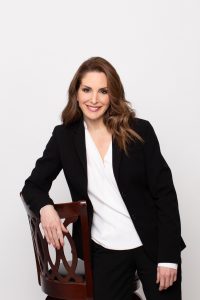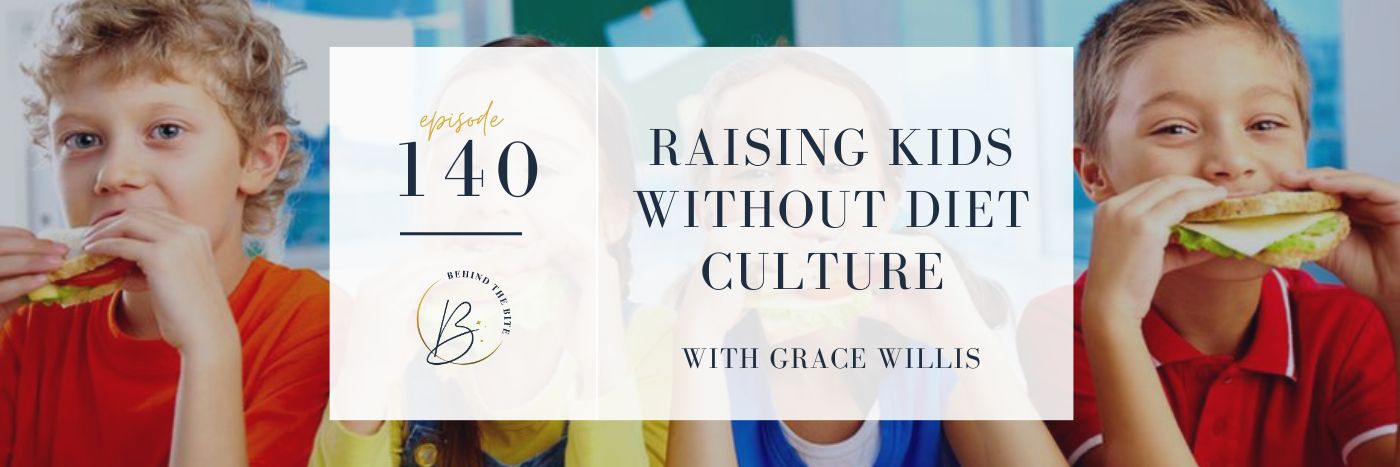MEET GRACE WILLIS

Grace Willis is a mum of twins and a woman on a mission. She's determined to change the narrative around family mealtimes and show parents there's a different and less stressful way to feed their children, especially if they're fussy eaters. Grace's son was just three months old when he started to refuse his bottle. He was later diagnosed with Selective Eating Disorder. Grace then spent years talking to pediatricians and dieticians and navigating her way through medical research and theory on eating; knowledge that helped her son develop healthy eating habits and that she's since passed on to her vast network of families through her Happy Little Eaters blog and business.
Visit Happy Little Eaters and connect on Instagram.
FREEBIE: Use promo code "behindthebite" to access Grace's guide to how to get your child to try new food!
IN THIS PODCAST
- The division of responsibility feeding approach
- Do not give food moral values
- Apps are not the be-all-end-all
The division of responsibility feeding approach
This is an approach to mealtimes that was developing in the US for parents and their young children. The parent is responsible for what food they serve, when they serve it, and where they serve it. The child then has two roles. They get to decide what they want to eat from your offering, and how much.Most parents … do it the opposite way around in our culture where we are in charge of how much the child eats and what they should eat … as soon as I found this out, it was an overnight change. (Grace Willis)When kids are relaxed and happy to eat, they will be less fussy. They may want fruits, vegetables, and everything else because they don’t feel pressured to specifically eat them. In this way, the division of responsibility comes from developing a child’s ability to self-regulate.
It feels very scary to let go, it’s unusual in parenting to let go, but this is one area of eating where it comes internally. (Grace Willis)
Do not give food moral values
At all costs, avoid giving food moral values. Don’t call some foods “bad”, “cheat meals”, “treats”, or things like that because children are very impressionable and it can have an impact. Additionally, when you restrict something, a person wants it more.It’s the children I see who are not allowed McDonald's and they’re not allowed sweets that [develop] a preoccupation with it. (Grace Willis)Of course, provide your children with a balanced diet that includes a wide range of food groups so that they do not have any deficiencies. Just be careful with your wording, because what you call something is how a child will understand it for a long time, if not for the rest of their lives.
I’m very mindful with my kids, [but] I’m not saying I have it perfect. I can’t control what external people say to my children and what they’re taught at school but I try my best not to talk about food like that. (Grace Willis)Kids need the skills to be in tune with their own bodies so that they know how to advocate for themselves later in life.
Apps are not the be-all-end-all
Modern technology gets you on convenience. It promises that it’ll take care of the tough things and it will tell you exactly what to do and when, and all you have to do is just to do it. Your app may recommend that you eat a certain amount a day. However, your app doesn’t know what type of day you’ve had. Your app doesn’t know how you felt, how your body is changing, exactly how much exercise you did, or what type of food you ate and how much. Don’t give in to this. You are the one in control, and you are the one that can decide. It’s your job to get to know your body, to create a safe place to listen and respond to what it asks of you.You’ve lost touch [with your appetite]. They need to be told what to eat … [but] if we all had the same food and calories in a day, we still wouldn’t look the same. So how can a Weight Watchers app tell me I should be eating XYZ [amount]? They have no idea what I’d been through that day. (Grace Willis)Learn to understand your body, what it needs from you, and how you can properly care for it. It’s yours to take care of, and it allows you to live your life. Love it, and be gentle!
USEFUL LINKS
- Visit Happy Little Eaters and connect on Instagram.
- PARENTING CHILDREN ABOUT DIET AND WEIGHT STIGMA WITH SUMNER BROOKS | EP 139
- Visit speakpipe.com/behindthebite and submit your comment via voice message!
- Sign up for the free Behind The Bite Course
- Practice of the Practice Network
- Email Dr. Cristina Castagnini: info@behindthebitepodcast.com
MEET DR. CRISTINA CASTAGNINI
 I am a licensed Psychologist and Certified Eating Disorder Specialist.
While I may have over 20 years of clinical experience, what I also have is the experience of having been a patient who had an eating disorder as well.
One thing that I never had during all of my treatment was someone who could look me in the eye and honestly say to me "hey, I've been there. I understand".
Going through treatment for an eating disorder is one of the hardest and scariest things to do. I remember being asked to do things that scared me. Things I now know ultimately helped me to get better. But, at the time, I had serious doubts and fears about it.
If even one of my providers had been able to tell me "I know it's scary, but I had to go through that part too. Here's what will probably happen...." then perhaps I would not have gone in and out of treatment so many times.
My own experience ultimately led me to specialize in treating eating disorders. I wanted to be the therapist I never had; the one who "got it".
I will be giving you my perspective and information as an expert and clinician who has been treating patients for over 2 decades.
But don't just take my word for it...keep listening to hear the truly informative insights and knowledge guest experts have to share.
I am so happy you are here!
I am a licensed Psychologist and Certified Eating Disorder Specialist.
While I may have over 20 years of clinical experience, what I also have is the experience of having been a patient who had an eating disorder as well.
One thing that I never had during all of my treatment was someone who could look me in the eye and honestly say to me "hey, I've been there. I understand".
Going through treatment for an eating disorder is one of the hardest and scariest things to do. I remember being asked to do things that scared me. Things I now know ultimately helped me to get better. But, at the time, I had serious doubts and fears about it.
If even one of my providers had been able to tell me "I know it's scary, but I had to go through that part too. Here's what will probably happen...." then perhaps I would not have gone in and out of treatment so many times.
My own experience ultimately led me to specialize in treating eating disorders. I wanted to be the therapist I never had; the one who "got it".
I will be giving you my perspective and information as an expert and clinician who has been treating patients for over 2 decades.
But don't just take my word for it...keep listening to hear the truly informative insights and knowledge guest experts have to share.
I am so happy you are here!


Comments